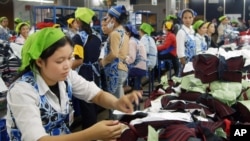The European Union on Monday began a formal process that could see Cambodia lose its preferential trading arrangements with its largest export market over its poor human rights and democratic record.
In January, the EU approved in principle removing Cambodia from its so-called Everything But Arms scheme, which allows Cambodian goods, particularly garments, to be exported to the EU tariff-free.
The EU has given Cambodia one year to improve the situation and engage with the EU to avoid having its privileges removed.
If after a year the EU decides Prime Minister Hun Sen’s government has not done enough to improve the rights situation over the following six months until August 2020 it will set in motion the withdrawal process, the EU said in a statement.
"It should be clear that today's move is neither a final decision nor the end of the process,” said EU Commissioner for Trade Cecilia Malmstrom in the statement. “But the clock is now officially ticking and we need to see real action soon… When we say that the EU's trade policy is based on values, these are not just empty words.”
EU is Cambodia's largest export market, a destination for over $5.5 billion in goods annually. Cambodia saves some $600 million in annual tariffs. Most of the goods that Cambodia exports into the EU are textiles and footwear, prepared foodstuffs, vegetable products, and bicycles.
But the government crackdown on civil society groups, independent media and the country’s main opposition party ahead of July’s national elections prompted the European Union and the international community to urge Cambodia to improve the situation or face sanctions.
The EU noted the continued deterioration of democracy, respect for human rights and the rule of law in Cambodia, despite acknowledging some positive political developments, including the release of opposition officials, civil society activists, and journalists.
“However, without more conclusive action from the government, the situation on the ground calls Cambodia's participation in the EBA scheme into question,” EU High Representative for Foreign Affairs Federica Mogherini said. “As the European Union, we are committed to a partnership with Cambodia that delivers for the Cambodian people. Our support for democracy and human rights in the country is at the heart of this partnership."
The Cambodian government called the decision an "extremely injustice."







